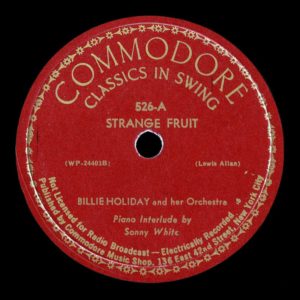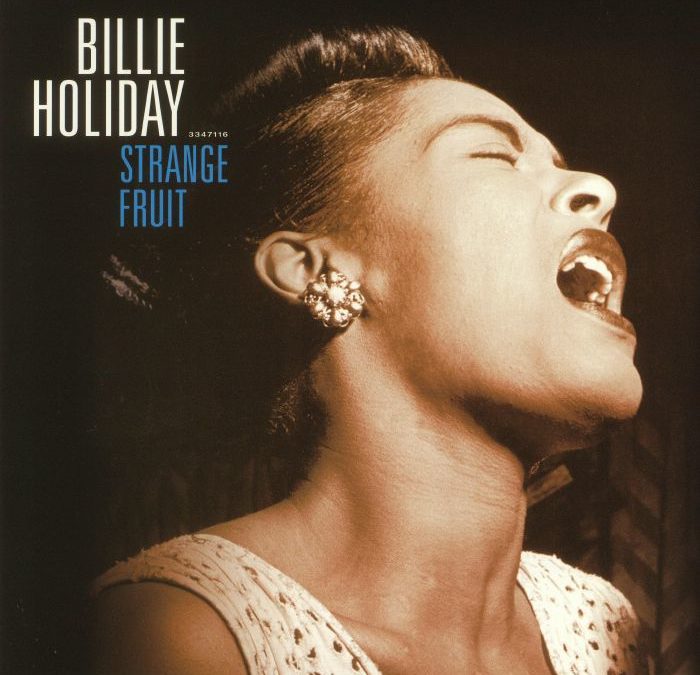“Strange Fruit” is a song performed most famously by Billie Holiday, who first sang and recorded it in 1939. Written by teacher Abel Meeropol as a poem and published in 1937, it protested American racism, particularly the lynching of African Americans. Such lynchings had reached a peak in the South at the turn of the century, but continued there and in other regions of the United States. According to the Tuskegee Institute, 1,953 Americans were murdered by lynching, about three quarters of them black. The lyrics are an extended metaphor linking a tree’s fruit with lynching victims. Meeropol set it to music and, with his wife and the singer Laura Duncan, performed it as a protest song in New York City venues in the late 1930s, including Madison Square Garden.
The song continues to be covered by numerous artists, including Nina Simone, UB40, Jeff Buckley, Siouxsie and the Banshees and Dee Dee Bridgewater and has inspired novels, other poems, and other creative works. In 1978, Holiday’s version of the song was inducted into the Grammy Hall of Fame. It was also included in the list of Songs of the Century, by the Recording Industry of America and the National Endowment for the Arts. Lyricist E. Y. Harburg referred to the song as a “historical document”. It was also dubbed, “a declaration of war … the beginning of the civil rights movement” by record producer Ahmet Ertegun.
Barney Josephson, the founder of Café Society in Greenwich Village, New York’s first integrated nightclub, heard the song and introduced it to Billie Holiday. Other reports say that Robert Gordon, who was directing Billie Holiday’s show at Cafe Society, heard the song at Madison Square Garden and introduced it to her.
Holiday first performed the song at Café Society in 1939. She said that singing it made her fearful of retaliation but, because its imagery reminded her of her father, she continued to sing the piece, making it a regular part of her live performances. Because of the power of the song, Josephson drew up some rules: Holiday would close with it; the waiters would stop all service in advance; the room would be in darkness except for a spotlight on Holiday’s face; and there would be no encore. During the musical introduction, Holiday stood with her eyes closed, as if she were evoking a prayer.
Holiday approached her recording label, Columbia, about the song, but the company feared reaction by record retailers in the South, as well as negative reaction from affiliates of its co-owned radio network, CBS. When Holiday’s producer John Hammond also refused to record it, she turned to her friend Milt Gabler, whose Commodore label produced alternative jazz. Holiday sang “Strange Fruit” for him a cappella, and moved him to tears. Columbia gave Holiday a one-session release from her contract so she could record it; Frankie Newton’s eight-piece Cafe Society Band was used for the session. Because Gabler worried the song was too short, he asked pianist Sonny White to improvise an introduction. On the recording, Holiday starts singing after 70 seconds. Gabler worked out a special arrangement with Vocalion Records to record and distribute the song.
[wiki] https://en.wikipedia.org/wiki/Strange_Fruit

In 1999, Time magazine named “Strange Fruit” the “song of the century.” The Library of Congress put it in the National Recording Registry. It’s been recorded dozens of times. Herbie Hancock and Marcus Miller did an instrumental version, with Miller evoking the poem on his mournful bass clarinet.
Miller says he was surprised to learn the song was written by a white Jewish guy from the Bronx. “Strange Fruit,” he says, took extraordinary courage both for Meeropol to write and for Holiday to sing.
“The ’60s hadn’t happened yet,” he says. “Things like that weren’t talked about. They certainly weren’t sung about.”
New York lawmakers didn’t like “Strange Fruit.” In 1940, Meeropol was called to testify before a committee investigating communism in public schools. They wanted to know whether the American Communist Party had paid him to write the song. They had not — but, like many New York teachers in his day, Meeropol was a Communist.
Journalist David Margolick, who wrote Strange Fruit: The Biography of a Song, says, “There are a million reasons to disparage communism now. But American Communism, one point it had in its favor was that it was concerned about civil rights very early.”
Meeropol left his teaching job at Dewitt Clinton in 1945. He eventually quit the Communist Party.
And that’s where the second part of Meeropol’s story begins. The link is the pseudonym he used when writing poetry and music: Lewis Allan.
“Abel Meeropol’s pen name ‘Lewis Allan’ were the names of their children who were stillborn, who never lived,” says his son, Robert Meeropol. He and his older brother, Michael, were raised by Abel and his wife, Anne Meeropol, after the boys’ parents — Ethel and Julius Rosenberg — were executed for espionage in 1953.
Julius and Ethel Rosenberg were sentenced to death for conspiring to give atomic secrets to the Soviet Union. The Rosenbergs had also been Communists.
Julius and Ethel Rosenberg are taken to prison after being found guilty of nuclear espionage. They were subsequently executed. The couple’s trial and execution made national headlines, and there was also something of a salacious element, given that the Rosenbergs were a married couple. News accounts described it as “the first husband and wife to die in the electric chair.”
At the time, the Rosenberg sons, Robert and Michael, were 6 and 10, respectively. News photographs of the boys show them dressed in suits visiting their parents in prison.
“They’re these little boys and they’re wearing these caps, and they look so young and so vulnerable. It’s really a very poignant image,” says Margolick.
Robert Meeropol says that in the months following his parents’ execution, it was unclear who would take care of him and his brother. It was the height of McCarthyism. Even family members were fearful of being in any way associated with the Rosenbergs or Communism.
Then, at a Christmas party at the home of W.E.B. Du Bois, the boys were introduced to Abel and Anne Meeropol. A few weeks later, they were living with them.
“One of the most remarkable things was how quickly we adapted,” Robert says. “First of all, Abel, what I remember about him as a 6-year-old was that he was a real jokester. He liked to tell silly jokes and play word games, and he would put on these comedy shows that would leave me rolling.”
There is something else about Abel Meeropol that seems to connect the man who wrote “Strange Fruit” to the man who created a loving family out of a national scandal. “He was incredibly softhearted,” Robert says.
For example, there was an old Japanese maple tree in their backyard, which sent out many new seedlings every year. “I was the official lawnmower,” Robert says, “and I was going to mow over them, and he said, ‘Oh, no, you can’t kill the seedlings!’ I said, ‘What are you going to do with them, Dad? There are dozens of them.’
“Well, he dug them up and put them in coffee cans and lined them up along the side of the house. And there were hundreds of them. But he couldn’t bring himself to just kill them. It was just something he couldn’t do.”
Abel Meeropol died in 1986. His sons, Robert and Michael, both became college professors. They’re also both involved in social issues. Robert founded the Rosenberg Fund for Children. And he says that even after all these years, he still finds himself unable to kill things in his own garden.


Recent Comments